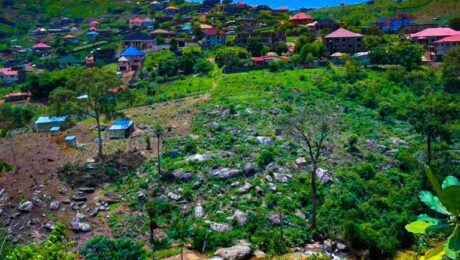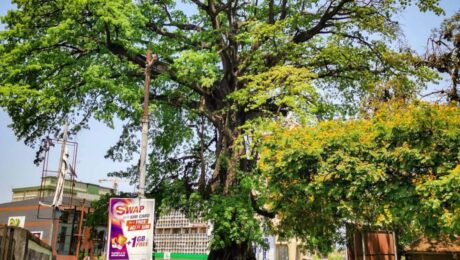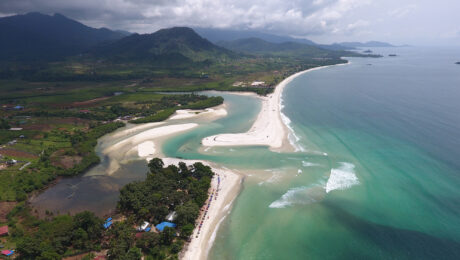Fourah Bay College:
Fourah Bay College (FBC) is a prestigious institution of higher education located in Freetown, Sierra Leone. Established in 1827, it is one of the oldest universities in West Africa and has played a crucial role in the educational, cultural, and political development of the region. Here’s a closer look at the history and significance of Fourah Bay College:
Historical Establishment:
- Methodist Missionary Roots:
- Fourah Bay College was founded by the Church Missionary Society (CMS), a British missionary organization with a strong presence in Sierra Leone. The institution was initially established as an institution for training African ministers but evolved into a broader educational institution.
- Educational Mission:
- The primary mission of Fourah Bay College was to provide higher education to Africans, particularly in the fields of theology, science, and the arts. It aimed to produce an educated class of Africans who could contribute to the socio-economic and political development of Sierra Leone.
Educational Influence:
- First Higher Education Institution:
- FBC holds the distinction of being the first institution of higher learning in sub-Saharan Africa. Its establishment marked a significant milestone in the history of education on the continent.
- Contribution to African Leadership:
- Over the years, Fourah Bay College has played a pivotal role in producing a cadre of educated individuals who went on to become leaders, intellectuals, and professionals in various fields. Many alumni have contributed significantly to the political, social, and cultural development of Sierra Leone and beyond.
Campus and Architecture:
- Historic Campus:
- The college’s campus is located on Mount Aureol, providing panoramic views of Freetown and the surrounding areas. The campus itself has historical buildings that reflect the architectural styles of the time, contributing to the overall heritage of the institution.
- Fourah Bay College Chapel:
- The college chapel is an iconic structure on campus and has historical significance. It stands as a symbol of the institution’s religious and educational foundations.
Challenges and Resilience:
- Challenges Over the Years:
- Like many institutions, Fourah Bay College has faced various challenges over the years, including financial difficulties, political disruptions, and periods of instability. Despite these challenges, the college has demonstrated resilience and a commitment to its educational mission.
Modern Era:
- Continued Relevance:
- Fourah Bay College remains a vibrant and relevant institution in contemporary Sierra Leone. It has expanded its academic offerings to meet the changing needs of society and continues to be a center for research, learning, and intellectual discourse.
- Contributions to National Identity:
- The college is integral to Sierra Leone’s national identity, and its alumni continue to play important roles in shaping the country’s future. The academic achievements of Fourah Bay College graduates contribute to the nation’s intellectual capital and cultural heritage.
Fourah Bay College stands as a testament to the enduring importance of education in Sierra Leone and the broader African context. Its rich history, influential alumni, and ongoing commitment to academic excellence make it a cornerstone of higher education in West Africa, contributing to the intellectual and cultural fabric of the region.
- Published in Uncategorized
Freetown Cotton Tree:
The Freetown Cotton Tree stands tall in the heart of Sierra Leone’s capital city, Freetown, and holds deep historical and cultural significance. This iconic tree is not only a natural landmark but also a symbol of the city’s founding and its connection to the abolition of the transatlantic slave trade. Here’s a closer look at the Freetown Cotton Tree:
Historical Significance:
- Founding of Freetown:
- The Freetown Cotton Tree is intertwined with the founding of Freetown itself. In 1787, a group of British philanthropists, abolitionists, and freed African-Americans established a settlement on the Sierra Leone Peninsula. It is said that under the shade of the Cotton Tree, these early settlers gathered to give thanks for their safe arrival.
- Abolitionist Movement:
- The tree became a symbolic meeting point for those who sought to abolish the transatlantic slave trade. Freetown was established as a haven for freed slaves, and the Cotton Tree served as a focal point for discussions, prayers, and gatherings related to the abolitionist cause.
Physical Characteristics:
- Mammoth Size:
- The Cotton Tree is an impressive specimen, standing prominently in the center of Freetown. Its massive branches stretch out, providing a large and shady canopy. The sheer size and age of the tree make it a natural wonder and a distinctive feature of the city’s landscape.
- Botanical Significance:
- The Freetown Cotton Tree belongs to the species Bombax malabaricum, known for its large, cotton-like fruits and showy flowers. While the tree’s botanical features are fascinating, it is the historical and cultural associations that make it particularly noteworthy.
Cultural Symbolism:
- City Symbol:
- The Cotton Tree is widely recognized as a symbol of Freetown. Its image is often used in local art, literature, and even on the national currency. The tree represents the city’s origins, resilience, and the shared history of its diverse population.
- Ceremonial Gatherings:
- Over the years, the Cotton Tree has been the site of various ceremonial and cultural events. Its significance goes beyond historical contexts, as it remains a place where people gather for celebrations, protests, and community events.
Preservation Efforts:
- Heritage Conservation:
- Recognizing the cultural and historical importance of the Cotton Tree, efforts have been made to preserve and protect it. Conservation initiatives aim to ensure the longevity of this living symbol and maintain its place in Sierra Leone’s cultural narrative.
The Freetown Cotton Tree is not merely a natural marvel but a living testament to the city’s beginnings and its enduring connection to the abolitionist movement. As Freetown continues to evolve, the Cotton Tree remains rooted in history, providing both locals and visitors with a tangible link to the past and a symbol of hope, freedom, and unity.
- Published in Uncategorized
Bonthe Island:
Bonthe Island is a historically significant and culturally rich island located in the Sherbro River estuary off the southern coast of Sierra Leone. This island has played a notable role in the nation’s history, particularly during the colonial period, and it continues to be an intriguing destination with a unique charm. Here’s an overview of Bonthe Island:
Colonial Heritage:
- British Colonial Influence:
- During the 19th century, Bonthe Island, then known as Sherbro Island, served as a major hub for British colonial activities. The British established a base on the island, making it a center for trade, administration, and missionary work.
- Trading Post and Slave Trade:
- Bonthe Island played a role in the transatlantic slave trade, serving as a trading post. The island’s location in the Sherbro River made it strategically important for transporting goods and people. The remnants of this historical period can still be seen in some of the architecture on the island.
Architectural Heritage:
- Historical Buildings:
- Bonthe boasts a number of colonial-era buildings that reflect its historical significance. These structures include old warehouses, government buildings, and residences constructed during the British colonial era. Some of these buildings have architectural elements that harken back to the island’s past.
- Bonthe’s Old Wharf:
- The Old Wharf area is a historic part of Bonthe, characterized by its colonial-era architecture and its significance as a trading and shipping point. The wharf area has witnessed centuries of maritime activity and trade.
Cultural Significance:
- Krio Culture:
- Bonthe Island is home to a significant Krio population. The Krios are a community of descendants of freed slaves and liberated Africans who settled in Sierra Leone. The island’s cultural fabric is influenced by Krio traditions, which have been preserved and passed down through generations.
Decline and Modern Era:
- Economic Decline:
- In the latter half of the 20th century, Bonthe experienced economic decline, partly due to changes in trade patterns and the closure of some of its key industries. However, the island’s historical legacy and cultural richness remain.
- Tourism Potential:
- In recent years, there has been increased interest in Bonthe Island’s tourism potential. Its historical sites, coupled with its natural beauty and cultural heritage, make it an attractive destination for those seeking a glimpse into Sierra Leone’s past.
Bonthe Island stands as a testament to Sierra Leone’s complex and multifaceted history. From its role in the slave trade to its colonial architecture and cultural heritage, the island offers visitors a unique opportunity to explore the layers of the nation’s past. As efforts to preserve and promote Bonthe’s historical and cultural assets continue, the island remains an important part of Sierra Leone’s identity and a destination that bridges the gap between the past and the present.
- Published in SIERRA LEONE
“From Abolition to Independence: Tracing the Tapestry of Freetown’s Storied History”
Freetown, the capital city of Sierra Leone, has a rich and complex history that spans centuries, shaped by the convergence of indigenous cultures, European exploration, the transatlantic slave trade, and colonial influences. The city’s story reflects the broader narrative of West Africa, the struggles for independence, and the ongoing challenges and triumphs faced by its residents. In this exploration of the history of Freetown, we will journey through key milestones that have defined this vibrant and resilient city.
Indigenous Roots:
The region where Freetown now stands was originally inhabited by indigenous groups, including the Sherbro and Temne people. European explorers, including the Portuguese, were among the first outsiders to arrive on the shores of Sierra Leone in the 15th century. However, it wasn’t until the late 18th century that Freetown’s history would take a significant turn.
The Founding of Freetown (1787):
In the late 18th century, Freetown’s story became intertwined with the movement to abolish the transatlantic slave trade. In 1787, British philanthropists and abolitionists, along with some African Americans who had gained freedom, established a settlement on the Sierra Leone Peninsula. This settlement, initially named Granville Town, later became Freetown. The settlers aimed to create a haven for freed slaves and to serve as a base for British efforts to suppress the slave trade in the region.
The Struggle for Freedom:
Freetown became a refuge for liberated Africans, offering them a chance at a new life. However, the early years were marked by challenges, including clashes with indigenous groups and the struggle to establish a stable community. The British established the Sierra Leone Company in 1791 to govern the settlement, but tensions persisted.
Abolition of the Slave Trade and British Colonial Rule:
In 1807, the British Parliament passed the Slave Trade Act, outlawing the transatlantic slave trade. Freetown played a pivotal role in the enforcement of this ban. The settlement became a naval base for the British anti-slavery squadron, patrolling the Atlantic to intercept slave ships.
As the 19th century progressed, Sierra Leone transitioned from being a settlement to a British colony. Freetown, with its strategic importance, developed as a hub for trade and administration. The city attracted a diverse population, including Creoles (descendants of freed slaves), Europeans, and people from various African ethnic groups.
Education and Cultural Development:
Freetown became a center for education and cultural development. Fourah Bay College, founded in 1827, became a leading institution in West Africa, producing a cadre of educated individuals who played crucial roles in the political and social life of the region. The city also became a melting pot of cultures, with influences from the Creole community, British colonizers, and various African ethnic groups.
Struggles for Independence and Post-Colonial Era:
The mid-20th century witnessed a surge in nationalist movements across Africa. Sierra Leone gained independence from British rule on April 27, 1961. Freetown became the capital of the newly independent nation. The post-colonial era, however, brought challenges, including political instability, economic struggles, and, eventually, a decade-long civil war that began in 1991.
Recent History and Renewed Hope:
The civil war, characterized by brutal violence and displacement, came to an end in 2002. Freetown, along with the rest of Sierra Leone, faced the immense task of rebuilding and reconciliation. In the years that followed, the city has experienced a slow but steady recovery, with efforts to strengthen democratic institutions, promote economic development, and heal the wounds of the past.
Conclusion:
Freetown’s history is a testament to the resilience of its people in the face of adversity. From its origins as a settlement for freed slaves to its role in the abolition of the transatlantic slave trade and its subsequent journey to independence, Freetown has been a key player in shaping Sierra Leone’s narrative. Today, as the city continues to grow and evolve, it stands as a symbol of hope, progress, and the enduring spirit of a nation.
- Published in Freetown, Humanity, SIERRA LEONE
The Ultimate Guide to Unforgettable Adventure Travel: Top Destinations and Must-Try Activities
Adventure travel enthusiasts seek the thrill of the unknown, the excitement of exploration, and the unforgettable experiences that come with pushing personal boundaries. If you’re ready to embark on a journey of a lifetime, this ultimate guide is your gateway to discovering the top destinations and must-try activities that will elevate your adventure travel to new heights.
- Patagonia, Argentina and Chile: Hiking the End of the World
- Explore the breathtaking landscapes of Patagonia, where jagged peaks, glaciers, and pristine lakes await. Dive into the world of trekking in Torres del Paine National Park and witness the awe-inspiring beauty of the “End of the World.”
- Queenstown, New Zealand: The Adventure Capital of the World
- Unleash your inner adrenaline junkie in Queenstown, New Zealand, known for its plethora of adventure activities. From bungee jumping off the Kawarau Bridge to jet boating on the Shotover River, Queenstown offers an adrenaline rush like no other.
- Costa Rica: Zip-Lining Through the Rainforest Canopy
- Immerse yourself in the biodiversity of Costa Rica while zip-lining through lush rainforest canopies. Experience the thrill of soaring above the treetops and witness exotic wildlife in their natural habitat.
- Iceland: Glacier Hiking and Ice Cave Exploration
- Discover the surreal landscapes of Iceland by hiking glaciers and exploring mesmerizing ice caves. Witness the power of nature as you traverse frozen wonders and witness the Northern Lights painting the night sky.
- Safari in Serengeti National Park, Tanzania: Witness the Great Migration
- Embark on a safari adventure in the Serengeti, where you can witness the awe-inspiring Great Migration of wildebeest and zebras. Get up close and personal with Africa’s iconic wildlife in their natural habitat.
- Rock Climbing in Yosemite National Park, USA: Conquer Granite Giants
- Yosemite’s granite cliffs provide the ultimate playground for rock climbers. Whether you’re a seasoned climber or a beginner, Yosemite offers a variety of routes amid stunning scenery, including the iconic El Capitan.
- Diving in the Great Barrier Reef, Australia: Explore the Underwater Wonderland
- Plunge into the world’s largest coral reef system and experience unparalleled marine biodiversity. Snorkel or scuba dive to witness vibrant coral formations, diverse marine life, and the mesmerizing beauty of the Great Barrier Reef.
Conclusion: Embarking on an adventure travel journey is about more than just reaching a destination; it’s about creating lasting memories and pushing your limits. The destinations and activities highlighted in this ultimate guide are just the tip of the iceberg in the vast realm of adventure travel. So, gear up, embrace the unknown, and make your next journey an unforgettable adventure that will stay with you for a lifetime. Adventure awaits!
- Published in Uncategorized




